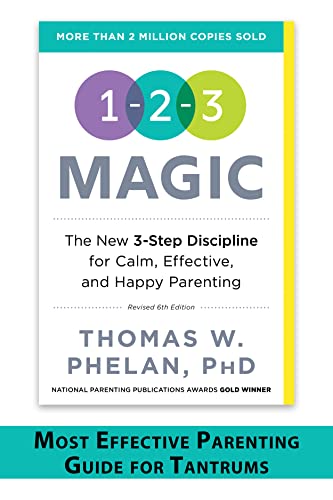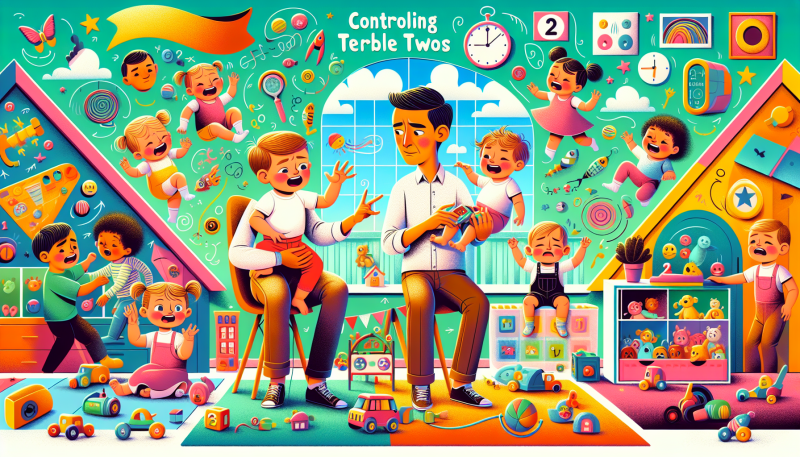Need to learn how to discipline a 2-year-old?
If you are a parent of a young child going through the terrible twos or older stages, then you have certainly been more than likely at the business end of an angry, perhaps even hysterical toddler throwing an extremely loud and ever so dramatic temper tantrum in a last-ditch attempt to get their own way.
Hard enough to handle at home, but what about when this happens in public?! You want to crawl away or sink into the floor, but no, you have to try and remain calm and positive and resist the urge to pick up your screaming child by the scruff of the neck and pull them into line! That, while temping, is NOT how to discipline a 2-year-old! :-)
It's an excruciating situation, full of embarrassment and intense frustration. So that's the problem... what's the solution, and what are some of the best ways to stop tantrums? Please read on where I outline four tips for stopping tantrums that you can use when you need to know just how to discipline a 2-year-old child or, in fact, children of all ages.
Why is This Happening to my Once Peaceful Toddler?
Your child is beginning to understand what is and isn't permissible, but he or she may test specific rules to see how you react. Pay attention to and appreciate positive actions while ignoring negative ones. When necessary, redirect to a different activity.
Tantrums may become more regular when your youngster strives to learn new skills and adapt to new settings. Anticipate tantrum triggers, like tiredness or hunger, and assist them with well-timed naps and meals. Teach your child not to punch, bite, or engage aggressively. Model and encourage peaceful conduct by avoiding smacking your child and dealing with disagreement constructively with the help of your partner. Maintain consistency in enforcing boundaries. If necessary, use brief time-outs.
Recognize sibling disagreements but avoid taking sides. For example, if there is a fight over a toy, the parent can put the toy away.
As parents, we have all had these unpleasant and embarrassing experiences. You can, however, learn how to discipline a 2-year-old, stop a toddler's temper tantrum in its tracks, and practice some really effective techniques that can prevent them from even happening in the first place. Prevention really is better than a cure!
Here are four tips for how to discipline a 2-year-old and stop tantrums:
Building the Steps to Improved Toddler Behavior and Clear Expectations for Your Child's Behavior are the foundations for discipline.
Here's where to begin.
Establish Family Rules
Starting with 4-5 family rules is a brilliant place to start. For instance, your family rules may be something like:
- We communicate effectively with one another.
- We take care of others.
- Everyone Pitches in Around the House
- We take care of our belongings.
Even from as young as three years old, your children can help you set the rules and explain why your family requires them.
Be a Role Model for the Behavior You Want to See
Children learn by observing what adults do. Showing your child the behavior you want by modeling it can help them learn. For example, if you want your child to sit down to eat, having family meals together might assist youngsters in acquiring this behavior.
Reward Your Youngster for Good Behavior 
When you praise your child, you tell them what you admire about them or their behavior. When your child receives praise for good behavior, he or she is more likely to desire to continue good behavior. Descriptive praise is such a tremendous positive behavior tool! It is used to tell your child precisely what you enjoy about them. It's ideal for instilling excellent behavior and often has quick and effective results. 'Ali, I really enjoy how you used please, and thank you just now.' Excellent manners!' Your child learns what to anticipate when you employ penalties consistently and for the same behavioral concerns.
Focus on What Your Toddler is Feeling, Not what You are Feeling
Children are no different from us regarding wanting to be listened to and understood. If you can understand what your child is feeling and show them that, it will go a long way towards getting on the same page.
Specifically, say you want to leave the park, and your toddler, desperate to stay, starts to put one on; phrase their words back at them to show you understand their feelings. For example, you might say, "Oh no, Kaleb is grumpy! He wants to stay and have fun and play at the park!" You might think this is fuelling the fire, but the opposite is true. Your toddlers' pattern is often interrupted; they feel empathy and will calm down enough for you to pick them up and carry them to the car.
Terrible Twos Toddlers Love Special Jobs!
No matter how hard it is to believe, your children are actually programmed to be helpful and cooperative! Giving your toddler a particular task right when you think a tantrum is imminent will often prevent or defuse a tantrum.
An example is getting your toddler to put their seat belt on - an often arduous task! Simply make them the "Seatbelt Manager," and the car doesn't move until everyone is strapped in and signed off by your little "master." While grocery shopping, get them to act as the lookout for very important items on the shelves and point out the direction of the checkouts.
Asking your child for help makes them feel important and valuable while simultaneously keeping their mind away from disruptive behavior and potential tantrums!
Give in to a Toddler Temper Tantrum and Pay the Price Forever!
Although giving in can sometimes seem tempting, especially in public, this is the number one way to discipline a 2-year-old mistake! By giving them what they want, you show them that this behavior is OK and will result in them getting what they want. Of course, this leads to repeated performances, and every time you give in after that, the pattern gets deeper scratched into their brain.
Just like learning what works, your child will also learn what doesn't work if you stick to your guns and refuse to let a temper tantrum sway you! Tantrums take energy, and no one likes to waste their energy - even toddlers!
How to discipline a 2 year old without even trying...
When your toddler throws a tantrum - just ignore them
Children are starved for attention, and many people are surprised to learn that in the eyes of children, sometimes any attention is good attention. Kids prefer positive attention, but if they don't get that, they will resort to being naughty and throwing a tantrum to elicit some kind of response - good or bad.

If we react to this situation, we give them what they want in some form, and again, like above, this behavior will be repeated repeatedly. Realize that even yelling or scolding your toddler during a tantrum gives them the attention they want.
Paying attention to a temper tantrum serves as a reinforcer, so one of the best ways to handle a temper tantrum is to turn off and ignore it simply. Don't look at, talk to, or respond to your toddler until the tantrum stops. To seal the deal, start lavishing positive attention on them the minute the inappropriate behavior ceases. This clearly conveys that good behavior is the only way to get your attention.
There are absolutely heaps you can learn about parenting difficult toddlers and young children and perhaps the easiest way is to listen to thumb your way (or scroll!) through this incredible book!
1-2-3 Magic: Gentle 3-Step Child & Toddler Discipline
Discover effective strategies for nurturing your toddler's development and fostering a loving bond without resorting to harsh discipline methods
Product information
$16.99 $7.78
Product Review Score
4.6 out of 5 stars
5533 reviews



